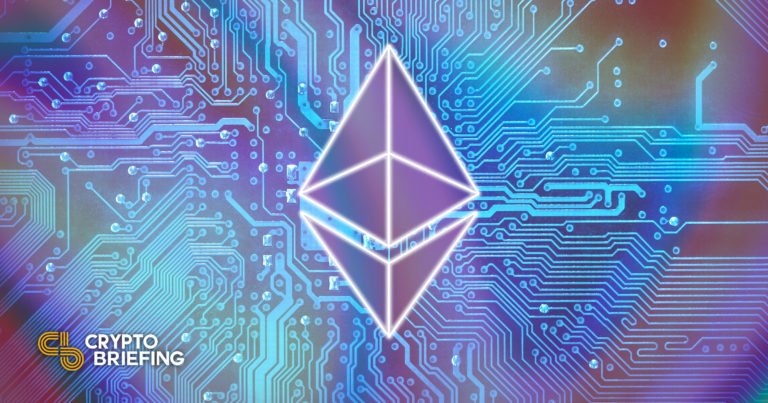EIP-1559 Has Burned 2 Million Ethereum

Key Takeaways
Ethereum has burned 2 million ETH via EIP-1559.
The blockchain’s next protocol update is “the Merge” from Proof-of-Work to Proof-of-Stake.
With the effects of EIP-1559 and reduced emissions from switching to Proof-of-Stake, ETH could soon become a deflationary asset.
Share this article
Ethereum’s next major update is “the Merge” to Proof-of-Stake.
EIP-1559 Burns 2M ETH
Ethereum keeps burning ETH.
According to data from ultrasound.money, the number one smart contract network hit 2 million ETH burned today. Since Ethereum shipped its London hardfork in August 2021, the total ETH supply has faced deflationary pressure via a fee burning proposal known as EIP-1559. Arguably Ethereum’s most popular update to date, EIP-1559 introduced a mechanism that burns a portion of the gas fee with every Ethereum transaction. EIP-1559 was devised to adjust Ethereum’s fee market as Ethereum gas fees previously adopted an auction system that made transaction costs unpredictable. With EIP-1559, Ethereum users pay a minimum fee for transactions known as the “base fee,” and they can add an optional tip to miners to get their transaction through faster during periods of high congestion. EIP-1559 also adds deflationary pressure on ETH and reduces the supply over time.
Per ultrasound.money, Ethereum currently burns just over 6 ETH per minute. A big chunk of that is consumed on OpenSea, the world’s biggest NFT marketplace. While Uniswap was previously the biggest gas guzzler on the network, a boom in the NFT market has led to OpenSea taking the top spot, with ETH transfers in second place ahead of Uniswap transactions.
Ethereum Prepares for the Merge
After the London hardfork, Ethereum’s next major protocol update is its long-awaited move from a Proof-of-Work to Proof-of-Stake consensus mechanism. The update, popularly referred to as “the Merge,” will see the blockchain’s consensus layer (otherwise known as the Beacon Chain) merge with the execution layer (Ethereum mainnet).
Anticipation for the merge has been building this week as Ethereum successfully completed a rehearsal of the event on the Kiln testnet (though the Ethereum Foundation’s Tim Beiko reported that one client failed to produce blocks during the runthrough). However, fans of the top smart contract network had been counting down to the Merge prior to this week; the move to Proof-of-Stake is expected to be one of the biggest events in the blockchain’s history. Besides introducing a key protocol change to pay ETH stakers rather than miners, Ethereum is also expected to become 99.95% more energy efficient, something that should be welcomed by the crypto community and mainstream alike.
Crucially, once the Merge takes place, it will drastically reduce ETH emissions. The ETH supply currently inflates by about 4.5% annually to pay miners, but with Proof-of-Stake, the annual emission is expected to be closer to 1%. As EIP-1559 routinely burns 6 ETH per minute, it’s estimated that the rate of ETH burned could surpass the amount issued in block rewards to validators. At that point, ETH would become a deflationary asset.
Though the launch date is yet to be confirmed, the Merge is tentatively scheduled to take place in June 2022.
Disclosure: At the time of writing, the author of this piece owned ETH and several other cryptocurrencies.
Share this article
The information on or accessed through this website is obtained from independent sources we believe to be accurate and reliable, but Decentral Media, Inc. makes no representation or warranty as to the timeliness, completeness, or accuracy of any information on or accessed through this website. Decentral Media, Inc. is not an investment advisor. We do not give personalized investment advice or other financial advice. The information on this website is subject to change without notice. Some or all of the information on this website may become outdated, or it may be or become incomplete or inaccurate. We may, but are not obligated to, update any outdated, incomplete, or inaccurate information.
You should never make an investment decision on an ICO, IEO, or other investment based on the information on this website, and you should never interpret or otherwise rely on any of the information on this website as investment advice. We strongly recommend that you consult a licensed investment advisor or other qualified financial professional if you are seeking investment advice on an ICO, IEO, or other investment. We do not accept compensation in any form for analyzing or reporting on any ICO, IEO, cryptocurrency, currency, tokenized sales, securities, or commodities.
See full terms and conditions.
What is a Crypto Airdrop: Why Projects Airdrop Crypto
Crypto airdrops occur when new tokens are freely distributed to different wallets in order to drive initial growth and build a community. They represent a popular marketing tactic that new projects use to spread…
EIP-1559 and the Future of Ethereum with Justin Drake
Justin Drake talks ahead of Ethereum’s EIP-1559 update, shipping as part of the London hardfork. A Landmark Year for Ethereum Ethereum is going through big changes. The price of ETH…
Ethereum Gas Fees Are Cheap Again. Why?
Gas fees on Ethereum have reached lows not seen in over nine months. While decreasing network activity is the main reason for the decline, the number of unique active users…
10M ETH Staked in Ethereum Consensus Layer Contract
The Ethereum consensus layer deposit contract has surpassed 10 million in ETH staked. This represents roughly 8% of the entire Ethereum supply. Ethereum’s Roadmap Momentum surrounding Ethereum’s switch from Proof-of-Work…















